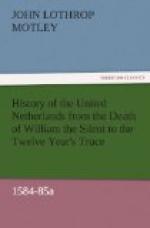The path of the Queen was thickly strewed with peril: her advisers were shrewd, far-seeing, patriotic, but some of them were perhaps over cautious. The time had, however, arrived when the danger was to be faced, if the whole balance of power in Europe were not to come to an end, and weak states, like England and the Netherlands, to submit to the tyranny of an overwhelming absolutism. The instinct of the English sovereign, of English statesmen, of the English nation, taught them that the cause of the Netherlands was their own. Nevertheless, they were inclined to look on yet a little longer, although the part of spectator had become an impossible one. The policy of the English government was not treacherous, although it was timid. That of the French court was both the one and the other, and it would have been better both for England and the Provinces, had they more justly appreciated the character of Catharine de’ Medici and her son.
The first covert negotiations between Henry and the States had caused much anxiety among the foreign envoys in France. Don Bernardino de Mendoza, who had recently returned from Spain after his compulsory retreat from his post of English ambassador, was now established in Paris, as representative of Philip. He succeeded Tasais—a Netherlander by birth, and one of the ablest diplomatists in the Spanish service—and his house soon became the focus of intrigue against the government to which he was accredited—the very head-quarters of the League. His salary was large, his way of living magnificent, his insolence intolerable.
“Tassis is gone to the Netherlands,” wrote envoy Busbecq to the Emperor, “and thence is to proceed to Spain. Don Bernardino has arrived in his place. If it be the duty of a good ambassador to expend largely, it would be difficult to find a better one than he; for they say ’tis his intention to spend sixteen thousand dollars yearly in his embassy. I would that all things were in correspondence; and that he were not in other respects so inferior to Tassis.”
It is, however, very certain that Mendoza was not only a brave soldier, but a man of very considerable capacity in civil affairs, although his inordinate arrogance interfered most seriously with his skill as a negotiator. He was, of course, watching with much fierceness the progress of these underhand proceedings between the French court and the rebellious subjects of his master, and using threats and expostulations in great profusion. “Mucio,” too, the great stipendiary of Philip, was becoming daily more dangerous, and the adherents of the League were multiplying with great celerity.




